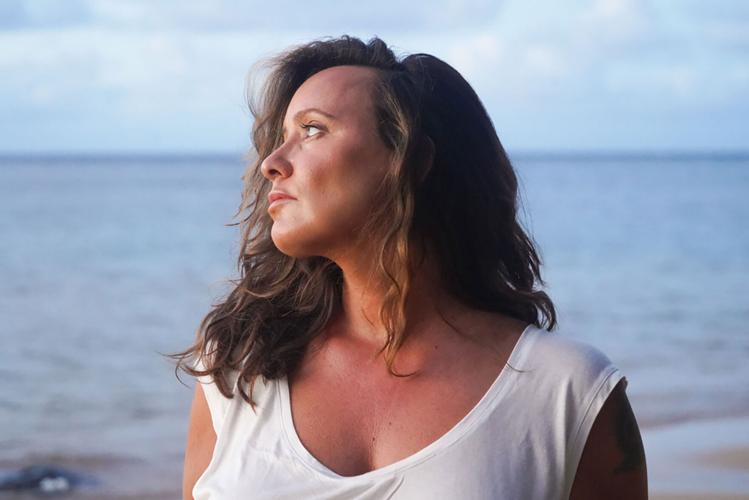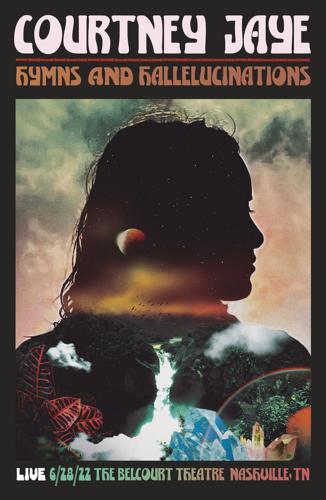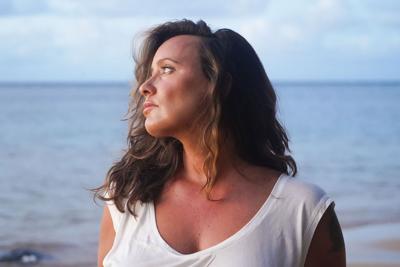Not having faith in religious organizations and hierarchies doesn’t have to mean you divorce yourself entirely from spirituality — from ideas about the importance of connections between humans and each other, or connections between humans and the world around them, or even that a higher power might somehow be involved in making it all work. But making those distinctions is a difficult task, made even harder when the public discourse is as extremely polarized as it has been for years.
Courtney Jaye, who lived in Nashville in the early 2010s but left for Hawaii and Los Angeles, took her time processing her personal and spiritual journey. Following her 2013 record Love and Forgiveness, she began work on a collection of psychedelic gospel songs, or as she put it, “spiritual music for weirdos.” Keyboardist Ikey Owens, who worked with The Mars Volta and Jack White among others, was a big source of encouragement and support when others weren’t as enthusiastic. Following Owens’ death in 2014, Jaye kept working on the project slowly but surely, and in May, she self-released the resulting album, Hymns and Hallelucinations.
The beautifully rendered songs — featuring a host of current and former Nashvillians, including William Tyler as musical director, Loney John Hutchins on guitar, Luke Schneider on pedal steel and more — are simultaneously soothing and engaging, blending various folk, blues and rock traditions with gospel as Jaye sings about where she’s been and what she’s learned about herself. She also worked with outstanding Nashville filmmaker Joshua Shoemaker on an accompanying film that illuminates the story and is synced to each song.
Physical copies of Hymns won’t be available until the fall, thanks to the kinks in the vinyl production pipeline, so Jaye isn’t planning a big tour until those are safely in hand. But she’s spending her summer in Music City and playing the album’s songs at a few shows, both here and on the West Coast. The band includes Jeremy Fetzer on electric guitar and Jonathan Trebing on acoustic, “Little Jack” Lawrence on bass, the aforementioned Luke Schneider on steel and Sam Smith, who you probably know as a drummer, on keys. Jaye wants to sing without playing any other instruments for these gigs.
The first of them is Tuesday, June 28, at the Belcourt. Jaye & Co. will play the record in full, and there will also be a screening of the film; the event kicks off at 7 p.m. Tickets are $15. If you can’t make that, you have another shot when the group heads down to The Basement on Thursday, July 21. Tickets are not yet on sale for that one. The Scene caught up with Jaye via phone last week.
For so many musicians, writing and playing music is about capturing feelings in motion, and it’s important to keep that motion going — to not sit on songs, so to speak. But your record is very much about being still and taking time to process things. Was it hard to put yourself in a position to do that?
Not really. I started writing this music back when I lived here, in 2014. So it really just has been this very sort of natural and organic process through the years. We wrote upwards of 50-something songs for this record, 50 or more. And so it really just was an over-time, very natural evolution. If you think about it, 2014 was a long time ago — like, Barack Obama was still president. It allowed for me to do a lot of growing in that time and with that — it sort of helped to shape the music and where this record ultimately ended up. Because when I first started writing it, I was in a place with religion where I was kind of mad at it, you know? And I was coming from this place of, “Fuck all of this.”
Over time, I really got to the bones of what my feelings are about God. I'm not religious, so I just sort of made a space for myself. The record sort of landed upon a little space where it's like, “Hey, you know, everybody, I'm not trying to push anything onto anyone. It's just not my style, but this exists and this is my experience over the years.”
There’s a polemic nature to conversations about religion and faith and spirituality. It seems like it takes a lot of effort to get to that place where you can separate out organized religion and all of its problems from being able to listen to yourself about what you feel and believe.
Totally. It's an ongoing process. I always am gonna keep searching — it's a longer conversation. I say this is, like, spiritual music for people who don't necessarily subscribe to anything in particular. Everyone comes with their own baggage with religion. I was very lucky, where I grew up with Judaism, but I never connected to the religion itself. And my family and my parents gave me freedom to sort of explore my own spirituality through the years, and nothing was forced upon me.
There was just a lot of freedom. ... It was really what came later — growing up and seeing how people use religion to mask their bigotry and their hate, and using God for all of these reasons that are just like, “Hold on, this is wrong and unacceptable.” It's really just been about allowing myself that space through the years.
Has this lengthy process of self-discovery and turning it into music changed anything about how you want to approach songwriting in the future?
Yeah. I really believe that there's some type of dignity with taking your time, and it is a luxury. It’s not ideal if you're looking at it from a music-industry standpoint — to sort of wait this long between solo records. But over time, I've sort of surrendered to the process. It's like, I've learned to be able to understand and feel when the music is done and when it's not, and when to keep pushing and when to keep searching and when to keep writing. ... This one was an abnormally long process that I don't think that I will do again for any other solo records that I do in the future.
But I think because of this being such a record about my personal journey, I think that I wouldn't feel right if it was [rushed] — it's a very large chunk of my life that I'm trying to show through this music. And I think that it needed to take that long. ... But yeah, it was really just the process of writing so many songs and really being able to edit. I've always been that way, but this one was just much, much more intense than normal records. I would say all in all it was a really rewarding process, too. It just kind of took me all over the place within myself, and forced me to really ask myself a lot of tough questions.

You and Joshua Shoemaker made a film that accompanies the record. When you sat down with him to plan that out, did you bring some things to the table that were crucial to get across?
In today's world, it's really tough to get people to listen to a whole record. I'm probably doing the opposite of what anyone should be doing today — to make a body of work that has more of a conceptual nature, and it all makes sense if you listen to it together, as opposed to being, you know, just putting on a song while you're making dinner. That's not what this record is. So it started to become apparent to me that a way that would make it sort of come together and make sense would be to have a full visual element to the record. Joshua, he and I had this conversation and, you know, he's just really fearless, and just somebody that is game for anything.
I really admire that, and I appreciate that. When I'm working with people anymore, it's just like, I don't wanna hear “no.” [Laughs.] Let's just figure it out and let's do it, and let's just jump in. It was really sort of a big undertaking for me, because I'm doing everything on my own these days. But he was just game for all of it. I knew I wanted to go to Hawaii to make it. I had been living there off and on the last few years, so I just started getting this idea in my head. I know a lot of the locations over there on the island, and it just all naturally came together. Up until the time he arrived, I was scouting locations, so we knew what we were doing already. And then we just jumped right in and just went for five days. We did, I think, two or three songs a day.
I wanted to ask about Ikey Owens. I think the first time I heard a song that ended up on this record, you were performing at the memorial show for him at The Basement in early 2015. And you mentioned how very important his support and encouragement was.
When I met him, it was 2013, and I was really in just — I would say, probably my lowest place. And just going through a lot of things personally and professionally. And really just wondering if I even wanted to continue to make music.
And you had just released a new record around that time.
This was exactly the time that Love and Forgiveness came out, and again, I was doing everything on my own, releasing it on my own. At that time there wasn't really a blueprint — like there's a little bit more of a blueprint these days, if you're a fully independent artist. But at that time, I didn't feel like there was much. So it just was a massive undertaking.
And then, [with] some things that I had gone through, through the years, it was just sort of like, “I don't know if I wanna keep doing this. And if I do keep doing it, I have to do something different. I have to do something that scares me. I have to do something that pushes me. I have to do something that is just showing a side of myself I've never shown before.” So it was very scary, because I think that I had just kind of lost confidence in myself and in the process — and in, just, life, you know?
Cue Ikey, coming in at that time. And I remember just saying to him — I was almost whispering it — I was just like, “Man, I think I wanna make a gospel record.” And he was just like, without question: “You have to do this. You must. Not only do you have to do this, but you have to do this so much that I'm gonna give you a title and a little melody line, and I want you to write a song.” [Laughs.]
And then that was “The Kingdom Is Inside of Me.” That was the first song that was written for this record. So I did that and I sent it back to him. Some of the last correspondence that I had with him was his reaction to the music, and just the encouragement of, “We have to make this music.” At the time, we were talking about him producing this record. That was where it started. And then of course he passed away, and in my heart, it was just a no-brainer. I knew that I would finish this record and I would make this record one day, for him. ... [His involvement] was, straight-up, just encouragement in a way that I needed to hear at that time. It was really valuable and it's something that I will never forget.







